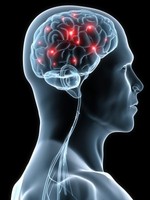The Durk Pearson & Sandy Shaw®
Life Extension NewsTM
Volume 18 No. 4 • August 2015
In the News: Women’s Dementia Worsens Faster Than Men’s
So says a headline in the July 22, 2015 The Wall Street Journal. According to the study (398 subjects who participated in the Alzheimer’s Disease Neuroimaging Initiative), women’s cognitive decline took place about twice as fast as men’s. The good news is that it is very likely, based on scientific studies showing that women need more choline than men do (Fischer, 2007), and that, as choline has been identified as a nutrient important to cognition (Poly, 2011) a deficiency of choline is one cause of this vulnerability to dementia in women. Not only does estrogen play an important role in the cholinergic nervous system (Fischer, 2007, Craig, 2010)—estrogen that declines rapidly following menopause—but it is known that in older people, choline is taken up less effectively into the brain (Cohen, 1995). In addition, women are much more susceptible to autoimmune diseases than men are and the cholinergic nervous system is a major antiinflammatory system (Tracey, 2007).
Add it all up and the evidence points to a need for additional choline in older women. The amount of choline recommended by the Institute of Medicine (IOM) for non-pregnant women, 425 mg a day, is (in our judgment) too low to supply adequate amounts of choline to older women when you consider the reduced ability to transport choline into the brain, the loss of estrogen, and also the variation (dietary composition (van Wijk, 2012), choline consumption, genetic and epigenetic differences in the ability to absorb choline from the diet, get it into the brain, and then convert it to phospatidylcholine via biochemical pathways) between individuals suggests that the amount that may be adequate for much of the population per the IOM recommendation may not be adequate for YOU.
In short, choline is a major nutrient for keeping your cognitive function in good condition as you get older. We ourselves take 2 grams a day of choline in the form of choline dihydrogen citrate.
References
- Fischer, daCosta, Kwock, et al. Sex and menopausal status influence human dietary requirements for the nutrient choline. Am J Clin Nutr.85(5):1275-85 (2007).
- Poly, Massaro, Seshadri, et al. The relation of dietary choline to cognitive performance and white-matter hyperintensity in the Framingham Offspring Cohort. Am J Clin Nutr. 94:1584-91 (2011).
- Craig, Brammer, Maki, et al. The interactive effect of acute ovarian suppression and the cholinergic system on visuospatial working memory in young women.35:987-1000 (2010).
- Cohen, Renshaw, Stoll, et al. Decreased brain choline uptake in older adults. An in vivo proton magnetic resonance spectroscopy study. 274(11):902-7 (1995).
- Physiology and immunology of the cholinergic antiinflammatory pathway.J Clin Invest.117(2):289-96 (2007).
- van Wijk, Watkins, Bohlke, et al. Plasma choline concentration varies with different dietary levels of vitamins B6, B12and folic acid in rats maintained on choline-adequate diets. Br J Nutr. 107:1408-12 (2012).

